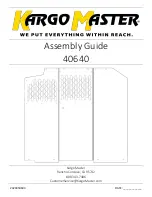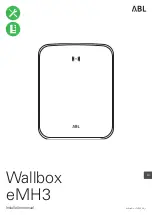
I01�High-voltage�Components
6.�Charging�the�High-voltage�Battery
126
Index
Explanation
1
Connection�for�proximity�line
2
Connection�for�phase�L1
3
Connection�for�protective�earth�(PE)
4
Connection�for�neutral�conductor�(N)
5
Connection�for�pilot�line
6
Protective�cap�for�AC�charging�socket
7
Protective�cap�for�DC�charging�socket
8
Connection�for�DC�ground�cable
9
Connection�for�DC�positive�wire
The�charging�socket�in�the�vehicle�for�combo�charging�includes�the�sockets�for�AC�charging�and�the
socket�for�DC�charging.�The�advantage�of�this�charging�socket�configuration�is�that�the�customer�can
use�both�AC�charging�stations�and�DC�charging�stations�for�charging�the�high-voltage�battery.
During�DC�charging�an�electric�arc�may�form�by�disconnecting�the�charging�plug�during�the�charging
procedure.�To�prevent�this�the�charging�plug�is�locked�electromechanically�during�the�charging
procedure.�This�way�a�possible�dangerous�situation�for�the�user�is�avoided.�An�ergonomic�handle�at
the�charging�plug�and�low�connection�and�disconnection�forces�enable�comfortable�operation�of�the
connector�using�only�one�hand.
Simultaneous�charging�via�AC�and�DC�is�not�possible.
6.4.3.�LIM
The�main�tasks�of�the�LIM�are�already�described�previously�in�this�chapter.�Only�the�additional
functions�and�tasks�of�the�LIM�for�combo�charging�are�described�here.�A�new�tasks�of�the�LIM�is,�for
example,�the�activation�of�the�switch�contactors�in�the�KLE�for�DC�charging.
Communication
Also�for�combo�charging�the�LIM�assumes�the�communication�between�the�vehicle�and�the�charging
station.�The�communication�between�the�vehicle�and�the�charging�station�is�enabled�and�the�charging
procedure�is�controlled�via�the�pilot�and�proximity�line.
Using�the�proximity�line�the�correct�connection�of�the�charging�cable�at�the�vehicle�is�identified�and�the
maximum�current�carrying�capacity�of�the�charging�cable�is�measured�by�the�LIM�using�the�resistor�in
the�charging�cable.
The�high-voltage�power�management�in�the�EME�sends�a�request�to�charge�the�high-voltage�battery
to�the�LIM�via�the�PT-CAN.�The�LIM�then�starts�the�communication�with�the�charging�station�via�the
pilot�line.�The�information�about�charging�requirement,�charging�range�and�accuracy�is�exchanged.
Only�after�successful�communication�start�is�the�charging�voltage�applied�to�the�phase�L1�or�to�the
DC�positive�wire�and�ground�cable.�This�also�gives�further�protection�for�customers�and�Service
employees�against�the�dangers�of�electricity.
The�LIM�sends�a�signal�for�"Enable�charging"�for�AC�charging�via�the�separate�line�to�EME�and�KLE.
Activation�of�the�switch�contactors�in�the�KLE
















































